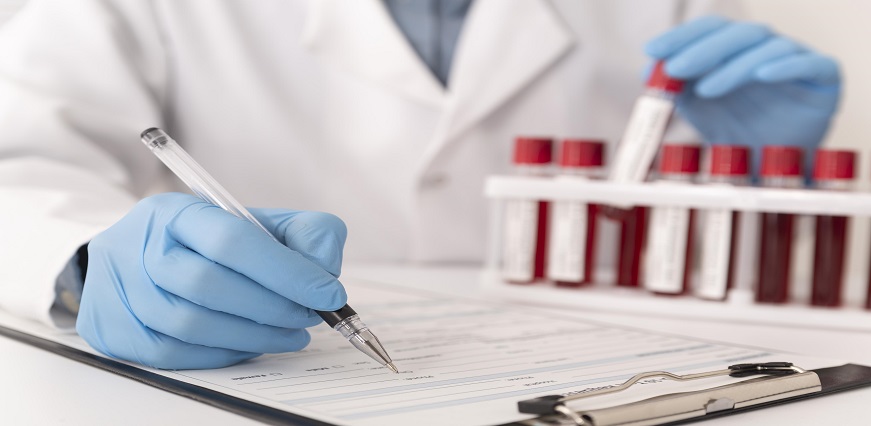


Max Lab
Jun 06, 2023
Have you ever heard of a Bilirubin test? It may sound unfamiliar, but it is an important test that can reveal vital information about your liver health. Bilirubin is a yellow pigment that forms when red blood cells break down, and the Bilirubin test measures the levels of this pigment in your bloodstream. Whether you're experiencing symptoms or just want to stay on top of your health, understanding the importance and process of this simple blood test is crucial. In this blog post, we'll dive into everything you need to know about the Bilirubin test - from its significance to how it's performed - so keep reading!
The Bilirubin test is a simple blood test that measures the levels of bilirubin in your bloodstream. Bilirubin is a yellow pigment that's produced when red blood cells break down. It travels to your liver, where it's processed and then excreted through bile into your small intestine.
The Bilirubin test is an important diagnostic tool used to measure the levels of bilirubin in the blood. Bilirubin is a yellow pigment produced during the normal breakdown of red blood cells in the liver.
High levels of bilirubin can indicate a problem with liver function, such as hepatitis or liver cirrhosis. It can also be caused by other conditions such as gallstones, hemolytic anemia, or certain medications.
Early detection and treatment are critical to prevent further complications that may arise from high levels of bilirubin. Without proper diagnosis and treatment, it could lead to serious health issues like jaundice or damage to organs.
In infants, high levels of bilirubin can cause brain damage if left untreated. This condition is known as kernicterus and requires immediate medical attention.
The Bilirubin test is a simple blood test that measures the levels of bilirubin in your blood. This test is commonly used to diagnose and monitor liver conditions such as jaundice, hepatitis, and cirrhosis.
To perform the Bilirubin test, a healthcare professional will draw a small sample of your blood using a needle. The procedure itself only takes a few minutes and typically involves little to no discomfort.
Once the sample has been collected, it will be sent to a laboratory for analysis. There, technicians will measure the levels of total bilirubin in your blood using specialized equipment.
In some cases, additional tests may also be performed alongside the Bilirubin test to provide more detailed information about liver function. These may include tests for alanine transaminase test (ALT) and aspartate transaminase (AST), which are enzymes that can indicate damage or inflammation in the liver.
After taking the Bilirubin test, you may be anxious to learn what your results mean. The test measures the level of bilirubin in your blood, which is a waste product produced when red blood cells break down.
If your bilirubin levels are high, it could indicate that there is an issue with how your liver processes bilirubin or other underlying conditions such as hepatitis or cirrhosis. On the other hand, low bilirubin levels may suggest that you have lower risk for certain liver diseases and conditions.
It's important to note that normal ranges for bilirubin levels can vary depending on factors such as age and gender. Your doctor will analyze your individual results along with any symptoms or medical history to determine if further testing or treatment is necessary.
Preparing for a Bilirubin test is relatively easy and straightforward. There are no particular dietary or lifestyle changes you need to make before the test. However, it's important to inform your doctor if you're taking any medications or supplements that may affect the results of the test.
It's also essential to fast for at least four hours beforehand if your doctor has ordered a fasting bilirubin test. This means avoiding food and drinks except water, as eating can temporarily raise bilirubin levels in the blood.
Like any medical procedure, the Bilirubin test has some potential risks associated with it. However, these are generally quite minimal and rare. The most common risk is minor bruising or pain at the site where blood is drawn for the test.
In very rare cases, patients may experience an allergic reaction to the needle puncture or antiseptic used to clean their skin before drawing blood. This is why it's important to inform your doctor if you have a history of allergies or reactions to medical procedures.
There's also a small chance that excessive bleeding could occur after the blood draw, particularly in people who have trouble clotting properly due to certain medications or conditions.
The normal range for Bilirubin levels varies depending on age, gender and overall health condition, but typically ranges between 0.2-1 mg/dL for adults and 1-12 mg/dL in newborns.
|
Total Bilirubin |
Age |
Normal Range |
|
0 - 1 day |
1.4 - 8.7 mg/dL |
|
|
2 - 3 days |
3.4 - 11.5 mg/dL |
|
|
4 - 5 days |
1.5 - 12.0 mg/dL |
|
|
Adults |
0.3-1.2 mg/dL |
|
|
Direct Bilirubin |
Adults |
< 0.2 mg/dL |
|
Indirect Bilirubin |
Adults |
0.2 to 0.8 mg/dL |
The amount of time required for this test may vary depending on different factors such as sample collection method, laboratory workload, and transportation time. Generally, it takes about 5-10 minutes to collect a blood sample from an individual's vein or by pricking their finger using a lancet device. After collecting the sample, it will be sent to the lab for analysis which can take anywhere between 24 hours to several days depending on specific testing procedures and equipment availability. However, some facilities offer rapid tests that give results within a few minutes but are less accurate than traditional methods.






Comments